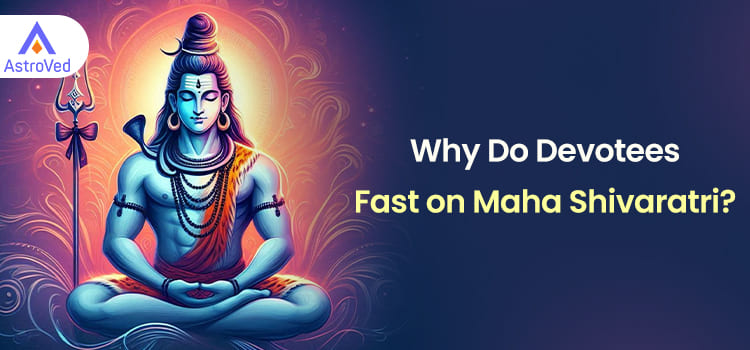Why Do Devotees Fast on Maha Shivaratri?
Maha Shivratri is one of the most important festivals in Hinduism. It honors Lord Shiva, the destroyer Archetype in the Hindu religion. It is celebrated with great enthusiasm and devotion on the 14th day of Krishna Paksha in Phalguna month (February-March). The festival is celebrated all over India. Each region has certain unique traditions associated with the festival. People observe fast and other rituals on this auspicious occasion to gain spiritual progress and divine blessings. It is also a way to express devotion to the deity and demonstrate self-discipline.
In 2025, Maha Shivratri falls on March 8.
 Significance of Maha Shivratri Fast/Vrat
1.Fasting helps detoxify the body and purify the mind
During the fast, the body feels light. The mind also relaxes and focuses better. It also becomes more alert. This helps prepare us for prayer and meditation during the Mahashivratri celebration.
Significance of Maha Shivratri Fast/Vrat
1.Fasting helps detoxify the body and purify the mind
During the fast, the body feels light. The mind also relaxes and focuses better. It also becomes more alert. This helps prepare us for prayer and meditation during the Mahashivratri celebration.
 Significance of Maha Shivratri Fast/Vrat
1.Fasting helps detoxify the body and purify the mind
During the fast, the body feels light. The mind also relaxes and focuses better. It also becomes more alert. This helps prepare us for prayer and meditation during the Mahashivratri celebration.
Significance of Maha Shivratri Fast/Vrat
1.Fasting helps detoxify the body and purify the mind
During the fast, the body feels light. The mind also relaxes and focuses better. It also becomes more alert. This helps prepare us for prayer and meditation during the Mahashivratri celebration.
Participate in the Maha Shivaratri Rituals
2. Increases the power of prayers Our intentions and prayers become stronger when the mind and body become purified. Those who observe the Shivratri fast with meditation may succeed in manifesting their desires. It is easier to get Shiva’s grace when one observes the Shivratri vrat in a sincere and devout manner. 3.Helps focus on meditation Doing meditation on Maha Shivratri is a 100 times more effective than meditating on other days. Hence, people meditate on this day. As fasting helps one to control the natural processes of the body, it enables one to focus on the meditation without distractions. 4.Relieves sins Fasting helps get rid of negative emotions like lust, greed, anger, and anxiety. Devotees believe that fasting and chanting Shiva’s names can relieve them of their sins. Some people consume a minimal amount of easily-digestible food or just water and milk. Legend behind Maha Shivratri Fast The Gods and demons were enemies and fought each other often. However, they set aside their enmity and came together to churn the Milky Ocean for Amrit, the divine elixir of immortality. Vasuki, the serpent king, who lies coiled around Shiva’s neck, was the churning rope. During the churning process, a deadly poison called Halahala emerged from the ocean. It was poisonous enough to kill every living thing in the universe. The gods and demons requested Shiva’s help. To save the world from destruction, Shiva drank the poison. Goddess Parvati, his consort, feared that the poison would harm Shiva. To prevent the poison from going down his throat, she held His throat for one day and one night. As a result, his throat turned blue, and he got the name Neelakantha. As Parvati observed a fast during the entire day and night on this occasion, the tradition of fasting and keeping vigil all night during Mahashivratri came to be a part of the traditio Fasting Rules- Some devotees observe a complete fast and avoid all food and water.
- Others observe a partial fast and choose to consume only fruits, yogurt, milk, or buttermilk.
- Fasting rules can depend on one’s health and regional practices.






